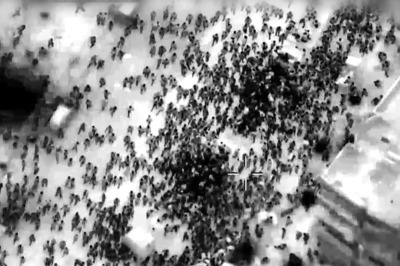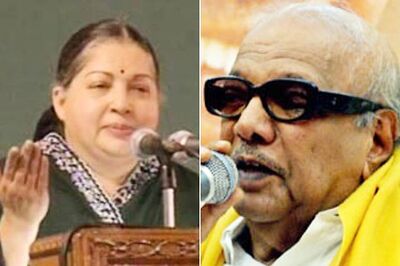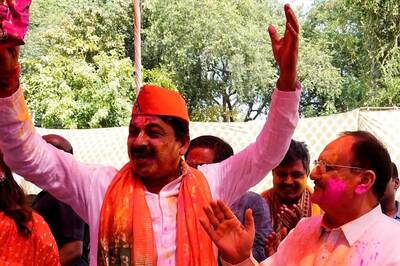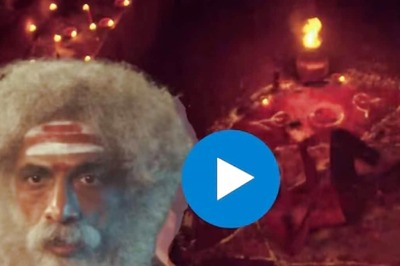
views
The UPSC Civil Services Exam (CSE) is undertaken by lakhs of people across the country every year, yet, only a small proportion of them clear the exam and move a step ahead. The UPSC exam is also demanding in terms of the size of its syllabus. Considering the highly uncertain nature of the examination today we have brought to you the UPSC Mains Examination 2022 Sample paper and Important Questions by Sriram Srirangam, Founder and Director of SRIRAM’s IAS.
Front note:
– Relevance and clear flow of logic with facts. That is what wins in the Mains Examination.
– Stick to the word limit as much as possible. A few words more or less is not a technical issue but may upset the time frame otherwise.
– Use appropriate words.
– May use diagrams for clearer communication.
– Underline the points. But not too many in a single answer.
– Be positive in your views.
Important Questions and Synoptic Model Answers:
Q.What in your views are `freebies`? What is problematic about them for public finance and economic development?
Ans:India is a welfare state and the Constitution establishes a socialist and inclusive republic. Economic growth appropriately designed takes care of welfare of the people, largely. However, millions of people have lagged behind and need additional help-by way of employment, subsidised food, mid day meals,free education,water and other such goods and services. There are merit subsidies for all such goods and services.However, in recent months, governments at both the centre and states have been feeling budgetary constraints due to the pandemic and the Ukraine war. Large numbers of people have become poor due to the pandemic impact.
Governments have been making schemes for their welfare and social security. There have been direct benefit transfers too for farmers, domestic help and so on for the stability of their social life and national economy too. However, government finances are constrained and so a debate is on to weed out the `freebies’ to save public finance and better target the available fiscal resources.
The health and progress of national economy depends on frugal and responsible management of the budgets.There is relative consensus on the fact that free power is a freebie and is damaging the environment;depleting natural resources;driving the electricity distribution companies bankrupt and debt-ridden;making banks incur NPAs.Fiscal discipline is needed in such policies. A high powered committee is to be set up to define and declare freebies on which there may be reasonable regulations.
There is a need for fiscal transparency too in the budgets to show how freebies are sought to be finances. As long as they are financed within the FRBM limits and not at the expense of social and physical infrastructure, they may be allowed. The challenge is to balance budgetary balance,welfare and long term capital formation.
Q.Duties are not separable from rights. Do you agree? Substantiate your views.
Ans: Rights and duties are inseparable. For example, right to education,removal of child labour,gender empowerment,national integration and so on. When we see rights and duties in Parts 3 and 4A respectively, their mutual dependence is clear. Similarly, exercise of rights has to be accompanied by the duty not to violate the rights of others. That is the basis for reasonable restrictions in Art.19.2. Likewise, Art.25 and the right to worship and freedom of conscience comes with the duty to be inclusive and respectful of others’ rights.
Q.What is `uncooperative federalism`? Discuss its significance in the Indian federal democracy today.
Ans:Because of the multiparty system in the country and the difference in the political positions of the parties, in federal democracy like ours, there is evidence of `uncooperative federalism`. American professors Jessica Bulman-Pozen and Heather K. Gerken are credited with the notion of uncooperative federalism.Supreme Court in Mohit Minerals case 2022 referred to it and in fact is deeply influenced by it in its ruling about the uncooperative federalism. It means that even as governance,welfare and national security of a federal nation depend on cooperation and working together, it is equally in evidence that states do demonstrate their uncooperative behaviour to show that they have policy differences. Examples are
● with draw general consent to CBI
● Pass resolution against CAA
GST Council acknowledges the same and leaves it to states to follow the consensus decision or not.
Q.What is Section 9A in The Representation of the People Act, 1951? Why is it in the news now?Provide the Constitutional perspective.
Ans: Section 9A in The Representation of the People Act, 1951 says that a legislator should not enter into contract with the government to make supplies to it or provide services to it. Both being commercial in nature involve conflict of interest;leads to loss legislative control over public finance etc. If a legislator violates the provisions, the Governor may refer the matter to the ECI to see if it is a case warranting disqualification. Presently, Jharkhand CM, Shri.Hemant Soren is under examination in a case involving Section 9A.
Q. What is windfall tax? On which goods was it imposed in India recently and why?
Ans:A windfall tax is a higher tax rate on profits that result from a sudden windfall gain to a particular company or industry, often as the result of a geo-political disturbance, war or natural disaster that creates unusual spikes in demand and/or interruptions to supply.
Historically, taxes on windfall profits have been imposed as a result of opportunistic ‘profiteering’ by companies. Notable instances of sudden and dramatic increases in oil industry profits as a result of the global economic sanctions imposed on Russia in response to their invasion of Ukraine in 2022.
In July 2022, the government of India introduced windfall taxes amid domestic crude producers making unusual profits due to the global impact of the Russia-Ukraine war. Domestic players reaped huge profit by selling crude to refiners at internationally benchmarked prices. The government of India then levied Rs 23,250 per tonne windfall tax on domestic crude production which was later adjusted as global prices fluctuated.
Government of India imposed and later revised the windfall taxes on exports of crude oil, diesel and Aviation Turbine Fuel (ATF).
It is important so that consumer taxes for domestic consumers can be reduced;inflation can be stabilised;government subsidy bill can be softened etc.
Q.The external balances of the emerging economies are becoming more and more fragile due to the recent black swan events. What is the International Monetary Fund(IMF) doing to mitigate the crisis?
Ans: The world needs to prepare for a series of cascading of financial crises across emerging and developing economies. Pakistan, Bangladesh, and Sri Lanka, to name a few, are currently requesting the International Monetary Fund for bail out. As the US dollar strengthens and global growth slows, many poor-country governments that are already seriously overstretched by COVID-19, and by the food and energy crises sparked by Russia’s war in Ukraine, must now contend with depreciating currencies and rising borrowing costs.
Adding fuel to the fire, foreign investors are withdrawing funds from emerging markets at a record pace. As a result, many of these countries are spending the foreign-exchange reserves that they had carefully built up after previous crises.
IMF has taken important initiatives to help the countries under BOP crisis. In 2021, IMF’s New Arrangements to Borrow (NAB) scheme, under which 38 countries have agreed to lend to the Fund should the need arise, was doubled in size and extended until 2025. The IMF also has bilateral borrowing agreements, the extension of which is currently being negotiated.
Furthermore, countries agreed in 2021 to a general allocation of $650 billion in SDRs, the largest in the Fund’s history. The allocation was intended to boost the global economy’s resilience and stability and to assist vulnerable economies that were struggling to cope with the COVID-19 crisis. But, because SDRs are distributed according to countries’ IMF quotas, which depend heavily on their GDP, the measure’s impact has been limited.
Case Study: There was a time when you saw a poor man walking out of the supermarket – he bought a kg of atta but actually had much more food hidden in his clothes which he managed to steal. You saw him walking out and taking out the stolen items in front of you. What choices do you have to respond? State the moral dilemmas you face? What appropriate moral action would you take?
Ans: I will report to the store manager and leave it to him as to what he does- report to the police or any other course of action within the scope of law.It does not matter whether he is poor or otherwise in this situation as not reporting will encourage pilferage which is illegal.Need not report to police as that is not the proper channel and may go against the policy of the store.
Case Study: Your friends tell you that they committed a crime. They explain that they are having trouble sleeping at night and feel you are the only one they can trust with their confession. A few days later, you read in the newspaper that someone has been arrested for your friend’s crime. Do you:
· Go to the police and tell them what you know?
· Encourage your friend to confess and warn him if he does not do so, you will tell?
· Say nothing because you will not betray a friend’s confidence?
Write down the arguments for and against each of the above options.
Ans: Following is one way to approach. There can be many other approaches.
Going to the police is not appropriate as there is no authentic evidence. What my friend told me can not be relied upon fully as it may not be true.
Encouraging the friend to confess may be the right way as if what he told me is true, he should tell the police and face the consequences.I can put pressure on him to do so.
Saying nothing is not an option as what is involved is a crime and confidentiality should not matter so much.
Few Important Questions
Q.Drones in border areas present a serious threat for border management in India. Elaborate.
Q. Mention three objectives of Central Bank Digital Currency(CBDC) that the Reserve Bank of India(RBI) is likely to issue soon. What are the three challenges associated with it?
Q. Is it possible to achieve broad-based and inclusive economic growth when there is high inflation? How should growth and inflation be reconciled?
Q.The solution for judicial delays lies outside the judiciary. Critically examine the statement.
Read | Brain Teaser: India’s First Metro Rail Service Was Commissioned in Which State? Can You Solve These GK Questions?
Q. What challenges did the Fifteenth Finance Commission face in giving its recommendations?
Q.What is Madden-Julian Oscillation? How does it differ from El-Nino? Discuss its impact on Indian Monsoon.
Q. Explaining the concept of social mobility and its relationship with equality, mention the impediments in ensuring it.
Q.The issue of multiple time-zones for a country like India keeps resurfacing. In this context, examine the feasibility of multiple time zones in India.
Q.Discuss the teachings of Buddha which you think are relevant in the 21st century.
Read all the Latest Education News and Breaking News here




















Comments
0 comment